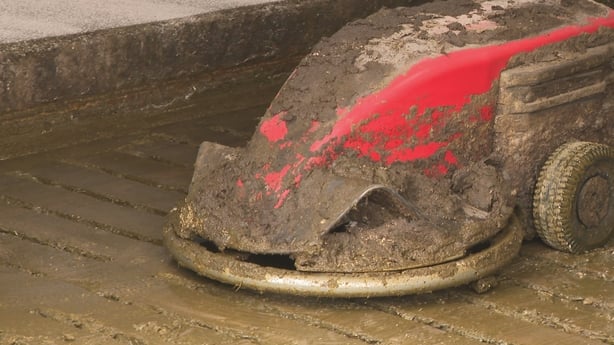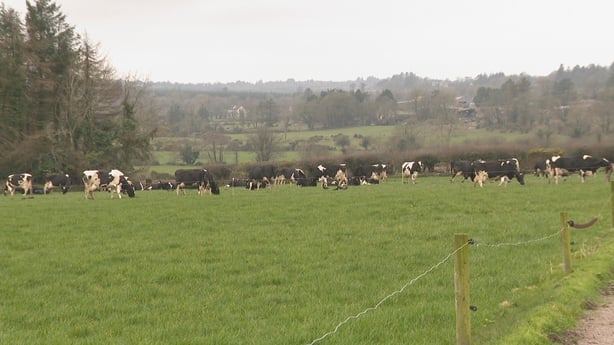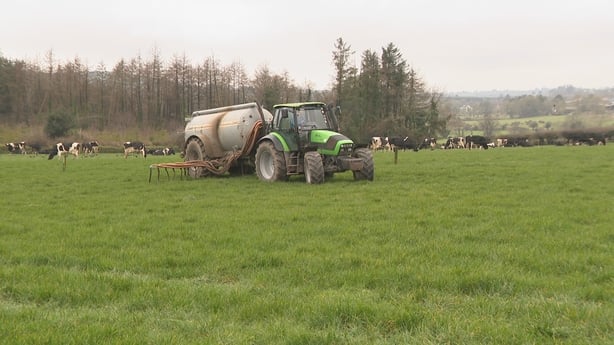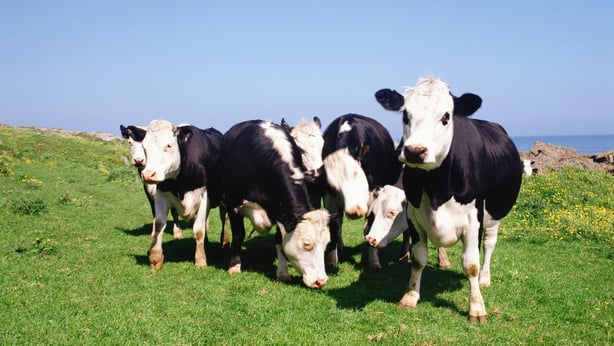Around 9km north of Bandon in Co Cork, in a townland called Scartnamuck, farmer Raymond Goggin has a spring in his step.
The manure from his 120 dairy cows produces about 1,000 tonnes of slurry every winter.
This year's slurry however, contains more nutrients than ever before so it will be far more effective as a fertiliser.
It is all down to a non-invasive new breakthrough technology capable of slashing greenhouse gas emissions from manure by more than 80%.
It is GasAbate, a product developed by a Galway-based company called Glasport Bio.
The GasAbate system was installed on Mr Goggin's farm last autumn when his animals were still out in the fields.
He says it took about a day and caused no disruption.
A network of small pipes was inserted into his slurry pits through which a liquid solution is automatically pumped.
The liquid then raises the oxygen level in the slurry pits. This prevents the anaerobic microbes that produce methane gas from working.
Dermot Hughes is Director of Engineering at Glasport Bio and explained how the system works.
"In a slurry tank, you've got an anaerobic environment. That means no oxygen. These are the conditions for anaerobic microbes to create greenhouse gases. That’s methane, nitrous oxide, hydrogen sulfide and ammonia. What we're doing with our additive is temporarily altering that environment by adding an oxygen-reactive species of chemical to inhibit the creation of those noxious gases.

"It's fully automated. It controls the dosing, the interval, and how often it’s dosed and treated over the winter period to ensure greenhouse gas emissions are suppressed."
Mr Goggin said it only required a single one-metre-cubed plastic drum of the liquid solution to cut 80% of the manure methane from 30 cows all winter long.
"I’m very happy with it. It works away on its own. The smell of the slurry, the amount it foams, and the amount of time it takes to agitate is greatly reduced. Hopefully it now has increased nutrients for further grass growth and that will be a good reward. It’s a positive story."
This is the kind of technological breakthrough that the Climate Change Advisory Council and the Irish Fiscal Advisory Council were begging for in a special joint report last week.
That report - 'A Colossal Missed Opportunity' - warned that the bill for Ireland missing its 2030 EU emissions targets could be as high as €26 billion.
It strongly recommended that the Government should spend massive amounts of money now in grants and other supports for climate action, instead of having to fork out billions for fines and carbon credits in the future.
GasAbate Executive Chairman Justin McCarthy said his product is one of the most cost-efficient technologies for reducing agricultural emissions.
"The Climate Change Advisory Council report talked about paying €3 billion to get 700,000 people to buy electric cars. The emission reduction that would achieve is around 4 million tonnes. That works out as €750 per tonne of carbon abated," Mr McCarthy explained.

"But if we rolled out GasAbate across all Irish farms, the cost per tonne of carbon abated would be just €75. This represents a fantastic return on investment for the government and the agri-food sector", he said.
Ireland is committed to reducing greenhouse gas emissions from agriculture by 25% by 2030.
About 11% of agricultural emissions come directly from manure.
This equates to about 4% of the country’s total greenhouse gas emissions from all sectors.
If, as is now being demonstrated on Raymond Goggin's farm, it is possible to reduce this portion of Ireland’s emissions by 80% overnight, that would be huge.
Everyone stands to gain, and not just in Ireland.
When it comes to climate change, methane gas is a super-pollutant.
It can trap about 84 times more heat in the atmosphere than carbon dioxide and is responsible for about one third of global warming since pre-industrial times.
Large-scale trials show the application of GasAbate delivers reductions of more than 80% in methane emissions, 50% in ammonia emissions, and cuts dangerous hydrogen sulphide emissions from animal waste and slurry by more than 80%.
Glasport Bio, the company that developed the product, said if it was rolled out on all Irish farms the amount of greenhouse gas emissions saved would be equivalent to taking over a half a million internal combustion engine cars off our roads.
It would also improve air quality by significantly reducing ammonia emissions and almost eliminating bad smells from farmyard slurry.
Slowing the microorganisms in the manure also enables the slurry to be store for longer without increasing emissions.

This could help farmers in meeting regulatory requirements related to Ireland's EU nitrogen derogation which is currently under threat.
Meanwhile, the extra nitrogen retained in the slurry can boost grass growth by up to 20%.
Results like these suggest this product offers a cost-effective alternative to herd reduction, while improving farm incomes, helping to deliver climate targets, and greatly benefiting the environment.
There is no question either, that in the era we are living in now, reducing greenhouse gas emissions is the key to making Irish agriculture more competitive internationally.
Mr McCarthy said that if all livestock slurry from cattle and pigs was treated with GasAbate, Ireland’s agriculture emissions would be cut by 1.8 million tonnes per year.
"That would represent 30% of the overall requirement for agricultural emissions reduction in Ireland", he says
"And if GasAbate was rolled out in the US and the EU you'd be talking about 80 million tonnes of carbon reduced, and all thanks to a slurry treatment product developed in County Galway in Ireland.
"But just like with heat pumps or electric cars all new technology requires adoption incentives. And farmers are no different. We are supporting other sectors of society to install heat pumps or move to electric cars. There is a real onus on the government and the agri-food sector now to support farmers in the adoption of technology such as GasAbate", he added.
"It talks to economic sustainability for the farmer, but also it talks to less chemical fertilisers being necessary. That reduces nitrous oxide emissions. But it also improves water quality as well, because the more nutrients you can get from organic sources versus chemical sources, the better your soil quality, the better your water quality and the lower your greenhouse gases."
Farmland slurry and methane emmissions
Manure is rich in nutrients and is a valuable renewable resource. From the moment it is produced it starts to lose its nutrients in the form of methane, ammonia and other gases.
In the absence of oxygen microorganisms in animal waste operate to effectively deplete the nitrogen and carbon content of animal waste material or dung, and cause methane gas to be emitted.
However, this causes the slurry to be less potent, or weaker, than it otherwise would be as a fertiliser, or as an energy feedstock for anaerobic digestion plants.
But if the slurry is weaker then there is a greater need for farmers (who spread it as fertiliser on their land) to have to supplement it with expensive chemical fertilisers.
It also means anaerobic digester energy plant operators need additional energy crops to be co-digested alongside the animal slurry.

By directly addressing this issue GasAbate can deliver significant fertiliser cost savings to farmers and energy productivity gains in anaerobic digestion.
It can do all this too, without specialist equipment or disruption.
At the same time greenhouse gas emissions are reduced by 80% which is a huge benefit to society, to the climate, and to future generations.
The amount of expensive carbon credits the State will be obliged to purchase by 2030 for missing its legally binding EU greenhouse gas emissions targets would also be significantly lower.
Reducing methane is recognised as the quickest way to slow the pace of climate change.
GasAbate treats liquid manures or slurries in storage tanks, lagoons or liquid slurry ponds.
It is produced by the reaction of two active ingredients to create an environment that is not conducive to methanogens.
This causes them to shut down for a period, thereby preventing the production and the release of methane into the atmosphere.







